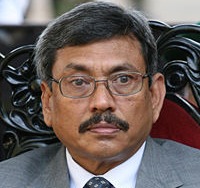 The Sri Lankan government has rejected a call by international donors to the Tamil Tiger rebels to negotiate terms of surrender with the government.
The Sri Lankan government has rejected a call by international donors to the Tamil Tiger rebels to negotiate terms of surrender with the government.
Defence Secretary Gotabhaya Rajapaksa told the BBC that the government would only accept an "unconditional surrender" by the rebels.
The donors – the US, Japan, Norway and the European Union – have also called on the Tigers to lay down their arms.
The government has ruled out a ceasefire and vowed to crush them.
Mr Rajapaksa told the BBC: "There is no question of negotiations on surrender. The rebels should surrender unconditionally. They should lay down their arms first."
He ruled out any amnesty for top rebel leaders, but said that "lower level cadres" would be "given amnesty, retrained, given vocational training and integrated into mainstream society".
Mr Rajapakse also rejected a ceasefire call by the US, UK and Canada, saying that the rebels had used ceasefire time "only to regroup and attack security forces".
"When the government declared a 48-hour ceasefire period last week, the rebels used the period to launch suicide attacks near the frontlines using three trucks loaded with explosives," he said.
The government and rebels have come under pressure to declare a ceasefire.
This will allow casualties to be evacuated from the war zone in the north-east. Up to 250,000 civilians may be trapped.
The Tigers have said they will not lay down their arms until they have a "guarantee of living with freedom and dignity and sovereignty".
Meanwhile, heavy fighting between the government forces and soldiers is continuing in the north-east of the country, says the BBC’s Anbarasan Ethirajan in Colombo.
(For updates you can share with your friends, follow TNN on Facebook and Twitter )
